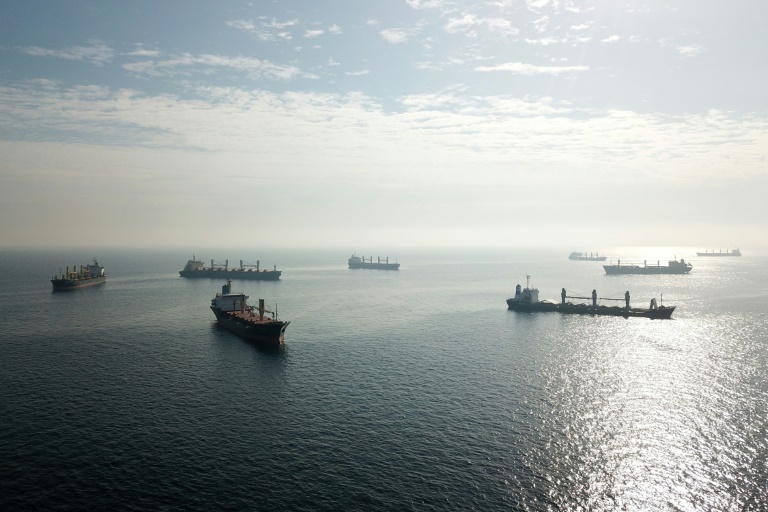Ukrainian grain exports have continued despite Russia pulling out of a deal to ensure safe passage for such ships in the Black Sea
Water and power supplies were fully restored in Kyiv on Tuesday a day after Russian missile strikes, as grain exports from Ukraine continued despite Moscow pulling out of a deal to let ships through.
Russian authorities meanwhile announced that tens of thousands more civilians would be “evacuated” from the Russian-occupied southern Ukrainian region of Kherson amid a counter-offensive by Kyiv.
Ukrainian presidential adviser Oleksiy Arestovich said Monday’s bombardment was “one of the most massive shellings of our territory by the army of the Russian Federation”.
Following the strikes, aerial views showed Kyiv plunged in darkness overnight, with the only lights coming from cars on the road.
In a town near Kyiv on Monday, the powerful explosions had woken up Mila Ryabova, 39.
Ryabova told AFP that she and her family were “worrying and talking about opportunities to move abroad, because there is a cold winter ahead. We may not have electricity, heat supply.”
Monday’s shelling had left 80 percent of the capital’s consumers without water and 350,000 homes without electricity.
On Tuesday, Kyiv mayor Vitali Klitschko said water and electricity supplies had been “fully restored” in the capital.
Klitschko warned that there would still be planned power cuts in the city “because of the considerable deficit in the power system after the barbaric attacks of the aggressor”.
Ukrainian energy operator Ukrenergo said it would limit supplies to all consumers in central and northern regions of the country to “reduce the pressure on the network”.
– ‘Help energy sector’ –
Ukrainian President Volodymyr Zelensky spoke to his French counterpart Emmanuel Macron Tuesday.
He thanked Macron for “specific decisions on strengthening Ukraine’s defence capabilities. Specific initiatives to restore the destroyed energy infrastructure.”
EU commissioner for energy Kadri Simson arrived in Kyiv “to help scale up support to the Ukrainian energy sector”, she said on Twitter.
The Ukrainian army said Russia launched 55 cruise missiles on Monday, mainly at energy infrastructure.
In a statement Tuesday, the Russian defence ministry claimed the “massive strikes… significantly disrupted the management and logistics of the Ukrainian armed forces”.
Russia has pivoted to systematically attacking Ukrainian energy infrastructure after setbacks on the battlefield, where the Russian army is facing pushbacks on the eastern and the southern fronts.
In the south, Kyiv’s forces are preparing for fierce battles to recapture the city of Kherson and its surrounding region.
Kherson is one of the four regions — along with Zaporizhzhia, Donetsk and Lugansk — that Moscow claims to have annexed but does not fully control.
– New ‘evacuations’ from Kherson –
Russian occupation authorities in Kherson said Tuesday that tens of thousands more people would be “evacuated” from the region amid Kyiv’s counteroffensive.
This comes after 70,000 people already left their homes in Kherson, Moscow-installed local authorities said last week.
The Russian-backed leader of the Kherson region, Vladimir Saldo, said Tuesday new resettlements were being carried out because of the risk of a “massive missile attack” by Ukrainian forces on a local dam.
But Ukraine said that Russian “occupiers are carrying out forced displacement of the civilian population”.
“Citizens living in premises along the banks of the Dnipro river are being forcibly evicted from their homes,” the General Staff of the Ukrainian Armed Forces said on Facebook on Tuesday.
– Grain corridor –
Also on Tuesday, three more grain-loaded cargo ships left Ukrainian ports despite Russia’s decision to suspend its participation in a deal to allow grain exports to cross the Black Sea.
Russia announced the move after accusing Kyiv of a “massive” drone attack on its fleet on Saturday, which Ukraine labelled a “false pretext”.
Turkish President Recep Tayyip Erdogan, whose country brokered the July grain export agreement along with the United Nations, is to speak with his Russian and Ukrainian counterparts in the coming days with the aim of restoring the deal.
Kremlin spokesman Dmitry Peskov said it was “risky” to continue the exports without Russia’s consent.
In his evening address Monday, President Volodymyr Zelensky said the grain deal breakdown was “clear evidence that Russia will continue to oppose itself to the entire international community”, adding it was “very important now to prevent this global destabilisation”.










